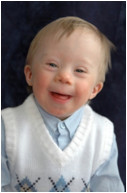Note: In fall 2024, NIH will publish a request for applications (RFA) for these centers. Please refer to NOT-HD-24-023 for important details about the upcoming RFA. The Frequently Asked Questions page also offers some additional information.
Overview
 This program, established the year after NICHD's founding, supports researchers whose goals are to advance understanding of a variety of conditions and topics related to intellectual and developmental disabilities (IDDs). NICHD's Intellectual and Developmental Disabilities Branch funds the program, which includes 15 research centers, located at universities and children's hospitals throughout the country.
This program, established the year after NICHD's founding, supports researchers whose goals are to advance understanding of a variety of conditions and topics related to intellectual and developmental disabilities (IDDs). NICHD's Intellectual and Developmental Disabilities Branch funds the program, which includes 15 research centers, located at universities and children's hospitals throughout the country.
Centers have cores to provide infrastructure support for IDD-relevant investigator projects, including a Clinical Translational Core to promote development of clinical applications from basic science discoveries. Centers must also support an entirely new research component project that uses the cores of the center and addresses a priority theme area of emerging science in the field as articulated in the requests for applications. Dissemination, outreach, and training are additional priorities of the program.
Centers offer a variety of different research services through their cores, including bioinformatics and biostatistics; genomic, proteomic, and metabolomics facilities; cellular neuroimaging and optogenetic services; neuroimaging, including MRI, diffusion tensor imaging, and spectroscopy; and animal and human behavioral testing. Specific research projects have included evaluation of animals and humans with autism spectrum disorders, multimodal treatment studies in IDD conditions such as Fragile X syndrome, and studies of cerebellar development in preterm infants.
Many studies involve collaborations with researchers outside the program to leverage multiple funding sources. Although the centers differ in many aspects, including their scientific focus, size, lifespan, and history, they share a commitment to creating integrated research opportunities for investigators engaged in basic, clinical, and translational science related to IDDs.
Topic Areas
Areas of research for center investigators have included:
- Chromosomal conditions that cause IDDs, such as Prader-Willi, Angelman, Williams, and Down syndromes
- Conditions identified by newborn screening associated with cognitive impairment
- X-chromosome disorders, such as Rett and Fragile X syndromes
- Disorders that involve biochemical processes and metabolic issues related to brain functioning, brain injury, or long-term consequences to the brain, such as hypoxia, very low birth weight, phenylketonuria, and prenatal malnutrition
- Biological or biochemical mechanisms that cause behavioral problems, such as self-injurious behavior and impairments in language development
Current Sites
- Albert Einstein College of Medicine
- Baylor College of Medicine
- Children's Hospital Boston
- Children's Hospital of Philadelphia
- Children's Research Institute/Children's National Medical Center
- Kennedy Krieger Institute
- University of California, Davis
- University of California, Los Angeles
- University of Iowa
- University of North Carolina, Chapel Hill
- University of Rochester
- University of Washington
- University of Wisconsin, Madison
- Vanderbilt University Medical Center
- Washington University
More Information
- NICHD Contact: Melissa Parisi
 BACK TO TOP
BACK TO TOP